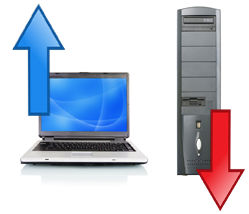Why on Earth Would You Still Buy a Desktop?

It's getting to the point where they might as well close the mid-tower factories and throw all the ATX power supplies into a giant landfill, where they'll rest on a layer just above the floppy drives, 56K modems, and AOL CDs. Today, research firm iSuppli announced that, in Q3 of this year, notebooks outsold desktops for the first time ever, with shipments for portable PCs rising 40 percent year-over-year while their stationary siblings were down by 1.3 percent.
Is anyone really surprised? The reasons to go with a desktop system keep shrinking (and we don't only say that because we work at LAPTOP Magazine). It used be the case that:
Notebooks cost more. But today, the price delta between mainstream laptops and desktops is minor. Today, you can get a budget laptop that's powerful enough to do reasonable mainstream tasks for $500 or less. You can even get a mainstream model with enough oomph for photo editing and some gaming for less than $700.
A glance at BestBuy.com as of this posting shows us that the lowest-priced desktop/monitor combination is a Compaq Presario with a single-core AMD Athlon processor and a 19-inch monitor for $399. What's the least-expensive laptop at BestBuy.com right now? A 15-inch Acer Aspire with a dual core Intel processor and 2GB of RAM for the same $399.
Notebooks weren't powerful enough to be primary PCs. While it's still true that you can usually get a bit more performance for your money with a desktop, the differences are minor unless you need a high performance workstation or game machine. A 2.0GHz Core 2 Duo CPU, Vista Home Premium or Vista Business, and 3 or 4GB of RAM provide solid performance for most home and business users. And those specs are easily attainable in a sub-$700 notebook. It's only when you need quad core processing or high-end graphics that the price of notebooks skyrockets.
Can you get a more powerful desktop for the same price as a mainstream laptop? Yes. But the better question is: how many home and business users will notice the difference in performance between a mainstream notebook with a dual core processor and a desktop with a few more GHz on the clockspeed or a quad core CPU? When surfing the Web, using Office software, watching movies, or playing most games, the differences could be hard to perceive.
Notebooks didn't have the storage capacity to hold all of your data. But today, mainstream notebooks come with hard drives that are 250GB or larger, which is plenty of room for even the biggest music buffs. And then there are always external backup hard drives that can be had for less than $100.
Stay in the know with Laptop Mag
Get our in-depth reviews, helpful tips, great deals, and the biggest news stories delivered to your inbox.
Not only have times changed, but it's also true that:
Notebooks use less power than desktops, even when they're plugged in and at full brightness. Businesses that equip all their employees with notebooks may see tangible savings in their utility bills.
Notebooks are easier to set up. Savvy users are tired of writhing around on the floor attaching a spaghetti bowl of cables before they power on or the first time. The less skiller are sick of asking their friends and relatives to do it for them.
Notebooks take up less space. This was true, even when they weighed 20 pounds, but today as systems shrink, businesses that give all their employees notebooks can use smaller workspaces and home-owners can have more room in the den.
Notebooks are portable. That goes without saying. But even people who rarely need to carry a computer outside the home or office can still have the luxury of carrying it around the building, without being tied to a desk. And of course that small technology known as Wi-Fi has pushed computing way beyond the reclining chair.
It's hard to imagine a future where desktops continue to dominate the market. Five years from now, it may actually be difficult to find a mini tower in retail. And Q3 of 2008 may just be remembered as the beginning of the end.
So who still needs a desktop?
- Power users who want super performance workstations or gaming machines. If you want quad core today, your notebook choices today are limited and expensive. Want a benchmark-busting Core i7 processor? Intel hasn't even come out with a mobile version of it yet and, when they do, it's likely to cost more and perform and lower clock speeds.
- Gamers can still get a bit more power for less cash by buying desktops, though some great new systems like the Alienware M17 and Gateway P-7811FX are starting to change that.
- Hobbyists who like to build their own rigs need desktop computers, because there's no real way to create your own notebooks. A few companies offer "built your own notebook" kits, but these offer very little flexibility.
Call us laptop lovers but the death of the desktop is starting to seem pretty real. What do you think? How many more years will it be before we stop seeing desktop computers on the shelves at Best Buy?

